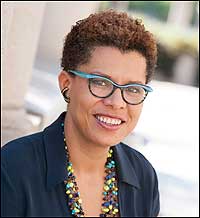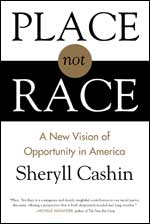Before Sheryll Cashin was a Georgetown University law professor, acclaimed author and popular speaker, she was an undergrad fresh from Huntsville, Ala., studying electrical engineering at Vanderbilt.

The transition was nearly seamless, she said, after spending time in a summer program at Tuskeegee University. And in Huntsville, home of NASA’s Marshall Space Flight Center, Cashin grew up surrounded by engineers and scientists of all kinds.
When she delivers the Chancellor’s Lecture at 5:30 p.m. Thursday, Sept. 4, in Sarratt Cinema, she’ll discuss affirmative action admissions policies and her book Place, Not Race: A New Vision of Opportunity in America. But it’s engineering, she said, that provided a problem-solving foundation to everything she’s accomplished.
Q: Growing up, what attracted you to the field of electrical engineering?
A: I went to the high school closest to Redstone Arsenal. A lot of my friends’ parents were engineers. My best friend’s father was an aeronautical engineer, and she had done a summer program at Tuskeegee — Minority Introduction to Engineering, which still exists — and she was going to Tuskegee to study electrical engineering. Like all kids, I was influenced by my peers.
It was not lost on me the salaries that could be earned. My parents were broke at the time, so I was very anxious about how to pay for college and how to have a decent life. Plus, I always loved math and did well in math and science. I didn’t know anybody who had been to Vanderbilt, but I did my research, and it was the best school in my orbit.
Q: Given that both women and African-Americans are historically underrepresented in engineering, did you have any concerns about entering the school?
A: There’s all this research about stereotype threat, but I didn’t have any lack of confidence in my ability to succeed in a scientific major. That was another thing about Vanderbilt. Vanderbilt prided itself on having a larger female population that most other schools of engineering. You could see that, and it also helped a lot.
Q: How did you find your engineering background helped you as you moved into law and writing about the subject of race relations?
A: It was enormously helpful. I had no problem whatsoever picking up the logic of law. There’s this saying in law schools that you need to learn to think like a lawyer. Well, engineers think like lawyers. There are steps and logic to legal thinking.
Race relations is a very gnarly problem. What I do in my writing is mine a lot of the social psychology research. I approach it as a scientist, dispassionately. If you read the first chapter of my book, I dive deep into a lot of the empirical research about what goes on in people’s heads, the gap in perceptions between whites and blacks. For the final chapter, I spent a lot of time researching what strategies and language helped to bridge these gaps.
I have no training in social psychology, but having a degree from Vanderbilt in electrical engineering makes me arrogant enough to believe I can read anything and understand it. People who are problem-solvers are drawn to the discipline of engineering.
Q: Your book argues that affirmative action ignores place and focuses purely on skin color. In a topic so complex and historic, what will you drill down on in your lecture?
 A: I’m going to try and begin with a map that just shows the degree to which affluent, highly educated people are segregated into their own communities. If you live in them, you have access to great schools, the opportunity system works, everything is wonderful. If you’re outside of them – the farther you are away of them, the harder it is. There’s less of what I call “college knowledge,” such as knowing what a FAFSA form is.
A: I’m going to try and begin with a map that just shows the degree to which affluent, highly educated people are segregated into their own communities. If you live in them, you have access to great schools, the opportunity system works, everything is wonderful. If you’re outside of them – the farther you are away of them, the harder it is. There’s less of what I call “college knowledge,” such as knowing what a FAFSA form is.
I recommend a holistic admissions process that emphasizes cumulative high school GPA – you can weight it for how challenging the courses were – and the willingness to forgo recreation to do academic work. That can be screened through recommendations, carefully worded essay prompts and interviews.
An academic organization can partner with The Posse Foundation, as Vanderbilt does, to find students with grit, resilience, and the willingness to be a study nerd although not surrounded by study nerds.
CONTACT:
Heidi Hall, (615) 322-6614
heidi.hall@vanderbilt.edu
Twitter: @VUEngineering